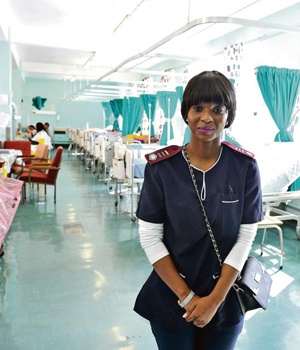
If you live in a predominantly urban province such as Gauteng or areas of the Western Cape, you are less likely to stand in long queues to get help from a nurse – unlike those people living in largely rural provinces such as the Eastern Cape.
This is because of a skewed distribution of nurses in favour of metropolitan areas.
Apart from this, figures show that at least half of the country’s 270 000 nurses work in the private sector, which services only 16% of the population. According to the Health Systems Trust, 270 437 nurses were registered with the SA Nursing Council (SANC) last year.
Nursing council statistics also paint a grim picture, indicating that 62% of the entire nursing workforce work in Gauteng, KwaZulu-Natal and the Western Cape, and the remainder are shared among the other six provinces.
Dr Terence Carter, deputy director-general responsible for hospital policy formulation and workforce development in the department of health, said the skewed distribution was a serious concern for government because it compromised the quality of healthcare in the public sector.
“The public healthcare sector provides treatment and care to 84% of the population, with the same number of nurses providing care to 16% of the population that can afford private healthcare. This skewed distribution compromises the quality of healthcare because the workload is heavy for nurses,” Carter said.
Though Professor Busi Bhengu, chairperson of the SANC, agreed there was skewed distribution, she said: “We should be careful not to generalise and say that the rest of the nurses who are not working in the public sector are working for private hospitals.
“The majority of them are in the private sector, but some are working abroad or just not practising. What we know for certain is that the number of those who emigrate has significantly decreased in recent years.”
Despite this skewed distribution of the nursing workforce, South Africa seems to be doing well in terms of the nurse-per-patient ratio. The latest official statistics indicate that the country maintains nursing figures above the minimum nurse-per-patient ratio set by the World Health Organisation (WHO).
The WHO recommends that there should be 200 nurses for every 100 000 people in a country. In South Africa, there are 500 nurses per 100 000 people. When this figure is broken down by removing enrolled nurses and nursing assistants, the figure drops to 246 professional nurses per 100 000 people – which still exceeds the WHO’s standards.
Carter attributed efforts to alleviate the shortage of nurses to several efforts introduced by government over the past few years.
“The department has introduced a bursary scheme that gives prospective students an opportunity to study nursing and, upon completion, they have to work for a certain number of years for the state as part of community service. A few years ago, we introduced the occupation dispensation system as a way to attract people into the profession.
“I can safely say that, though the system has not worked perfectly, we have seen an increasing number of young people joining nursing. We have also seen a decrease in the number of nurses, in particular those with scarce skills, leaving the country,” he said.
While those efforts seem to have bolstered the number of nurses available for the population, they seem to have had little effect on the number of nurses who choose to work in rural areas. Statistics from the SANC suggest that 167 587 of the 270 437 nurses registered with the council were working in metropolitan areas. Gauteng, for example, had the highest number of nurses at 70 024, while the Northern Cape had the least – 3 831.
Carter said this was a challenge faced by many other countries. “People just don’t want to work in rural areas. Rural allowances are offered to those who work in rural areas, but this doesn’t seem to entice people, and it’s not just nurses but doctors too.”




 Publications
Publications
 Partners
Partners








